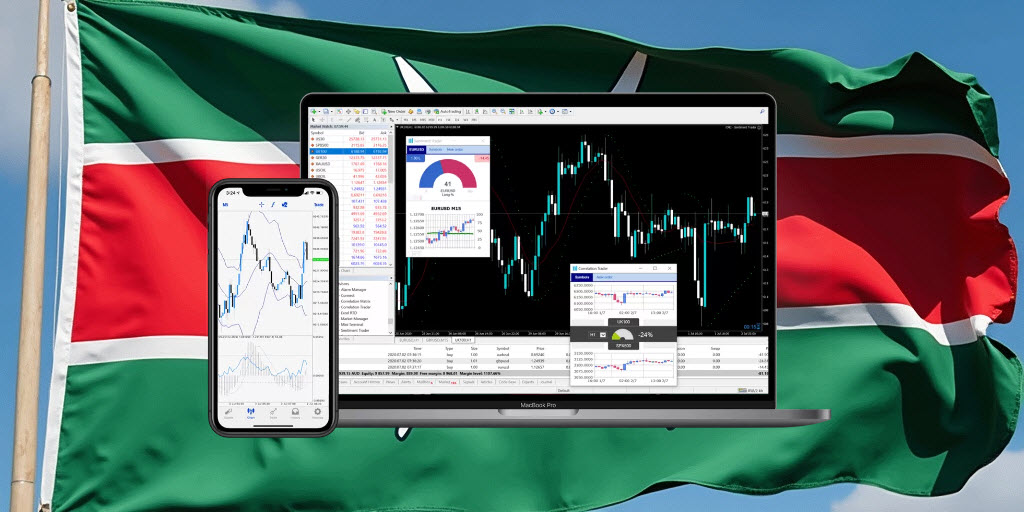

What is a demo account
A demo account is a free practice account that lets you simulate forex trading using fake money on a real trading platform. The forex simulation looks, feels, and works just the same as the real account. This makes the demo account an important training tool as you can trade without risking any real money.
A demo account can not only be used to learn forex trading, it is also a powerful tool that will help you get used to using new trading platforms like MT4 or MT5, test new trading strategies safely, and experiment with new functions you have not used before.
The trades you make in your demo account are governed by the development on the real forex market just like real trades. The only difference to real trading is that demo trading doesn’t affect your real money balance.
Which Broker offer the best demo account
The following are best forex brokers that will give you a free demo account
-
#1 Exness
Kenya accepted 🛡 RegulatorsFCA, FSCA, CMA, FSA, CBCS, BVIFSC, FSC, JSC# Assets100+🛠 PlatformsMT4, MT5, TradingCentral🪙 Minimum DepositVaries based on the payment system💹 InstrumentsCFDs on Forex, Stocks, Indices, Commodities, Crypto💲 CurrenciesUSD, EUR, GBP, CAD, AUD, NZD, INR, JPY, ZAR, MYR, IDR, CHF, HKD, SGD, AED, SAR, HUF, BRL, NGN, THB, VND, UAH, KWD, QAR, KRW, MXN, KES, CNY🫴 Bonus Offer-Visit BrokerKenya accepted.
🛡 RegulatorsFCA, FSCA, CMA, FSA, CBCS, BVIFSC, FSC, JSC# Assets100+🛠 PlatformsMT4, MT5, TradingCentral🪙 Minimum DepositVaries based on the payment system💹 InstrumentsCFDs on Forex, Stocks, Indices, Commodities, Crypto💲 CurrenciesUSD, EUR, GBP, CAD, AUD, NZD, INR, JPY, ZAR, MYR, IDR, CHF, HKD, SGD, AED, SAR, HUF, BRL, NGN, THB, VND, UAH, KWD, QAR, KRW, MXN, KES, CNY🫴 Bonus Offer-Visit BrokerKenya accepted. -
#2 RoboForex
Kenya accepted 🛡 RegulatorsIFSC# Assets30+🛠 PlatformsMT4, MT5, TradingView🪙 Minimum Deposit$10💹 InstrumentsCFDs, Forex, Stocks, Indices, Commodities, ETFs, Futures💲 CurrenciesUSD, EUR🫴 Bonus Offer$30 No Deposit BonusVisit BrokerKenya accepted.
🛡 RegulatorsIFSC# Assets30+🛠 PlatformsMT4, MT5, TradingView🪙 Minimum Deposit$10💹 InstrumentsCFDs, Forex, Stocks, Indices, Commodities, ETFs, Futures💲 CurrenciesUSD, EUR🫴 Bonus Offer$30 No Deposit BonusVisit BrokerKenya accepted. -
#3 IC Markets
Kenya accepted 🛡 RegulatorsASIC, CySEC, CMA, FSA# Assets75🛠 PlatformsMT4, MT5, cTrader, TradingView, TradingCentral, DupliTrade🪙 Minimum Deposit$200💹 InstrumentsCFDs, Forex, Stocks, Indices, Commodities, Bonds, Futures, Crypto💲 CurrenciesUSD, EUR, GBP, CAD, AUD, NZD, JPY, CHF, HKD, SGD🫴 Bonus Offer-Visit BrokerKenya accepted.
🛡 RegulatorsASIC, CySEC, CMA, FSA# Assets75🛠 PlatformsMT4, MT5, cTrader, TradingView, TradingCentral, DupliTrade🪙 Minimum Deposit$200💹 InstrumentsCFDs, Forex, Stocks, Indices, Commodities, Bonds, Futures, Crypto💲 CurrenciesUSD, EUR, GBP, CAD, AUD, NZD, JPY, CHF, HKD, SGD🫴 Bonus Offer-Visit BrokerKenya accepted. -
#4 Deriv
Kenya accepted 🛡 RegulatorsMFSA, LFSA, BVIFSC, VFSC, FSC, SVGFSA# Assets40+🛠 PlatformsMT5, cTrader, TradingView🪙 Minimum Deposit$5💹 InstrumentsCFDs, Multipliers, Accumulators, Synthetic Indices, Forex, Stocks, Options, Commodities, ETFs💲 CurrenciesUSD, EUR, GBP🫴 Bonus Offer-Visit BrokerKenya accepted.
🛡 RegulatorsMFSA, LFSA, BVIFSC, VFSC, FSC, SVGFSA# Assets40+🛠 PlatformsMT5, cTrader, TradingView🪙 Minimum Deposit$5💹 InstrumentsCFDs, Multipliers, Accumulators, Synthetic Indices, Forex, Stocks, Options, Commodities, ETFs💲 CurrenciesUSD, EUR, GBP🫴 Bonus Offer-Visit BrokerKenya accepted. -
#5 Trade Nation
Kenya accepted 🛡 RegulatorsFCA, ASIC, FSCA, SCB, FSA# Assets33🛠 PlatformsMT4🪙 Minimum Deposit$0💹 InstrumentsForex, CFDs, Indices, Shares, Commodities, Futures, Bonds, Spread Betting, Cryptos (Bahamas Entity Only)💲 CurrenciesUSD, EUR, GBP, AUD, ZAR, SEK, NOK, DKK🫴 Bonus Offer200 Sign-Up Reward PointsVisit BrokerKenya accepted.
🛡 RegulatorsFCA, ASIC, FSCA, SCB, FSA# Assets33🛠 PlatformsMT4🪙 Minimum Deposit$0💹 InstrumentsForex, CFDs, Indices, Shares, Commodities, Futures, Bonds, Spread Betting, Cryptos (Bahamas Entity Only)💲 CurrenciesUSD, EUR, GBP, AUD, ZAR, SEK, NOK, DKK🫴 Bonus Offer200 Sign-Up Reward PointsVisit BrokerKenya accepted.
Why do I use a Forex Demo Account?
To check the stability and quality of the trading platform
Before I sign up with a forex broker, I always take a look at which platform – or platforms – they offer. Some brokers offer platforms that I am already familiar with, such as cTrader and MetaTrader 4 (MT4), but there are also brokers that have proprietary platforms and/or offer one of the less-known third-party platforms.
I use the demo account to test run the trading platform to ensure it is a high-quality platform before I proceed any longer into the process. It is not fun to waste a lot of time signing up with a broker, confirming my identity, tweaking my trading strategy to suit the fee schedule, etcetera…..only to find out that the platform is slow, clunky, buggy, or simply unsuitable for may trading style. That is why I find it best to always spend some time and energy testing the platform in Demo Account mode before I decide if I want to continue the process or not.

To find out if this specific platform is suitable for me and my trading strategy
A broker, trading platform and fee structure that is suitable for Trading Plan X might be all kinds of wrong for Trading Plan Y. That is why it is a great idea to act out your detailed trading plan in Demo Account mode and evaluate, taking both your specific trading plan and other trading preferences into account.
To learn how the platform works before I put any real money on the line
A free Demo Account filled with play-money is a great way to learn how the trading platform works. I can place different order types, utilize the analytical tools, and more.
For many of us, learning this way is definitely better and more efficient than going through and memorizing user manuals and guides without getting any hands-on experience.
With a free Demo Account, you can do trial-and-error and commit a bunch of beginner mistakes before you actually put any real money on the line. That is a great way to preserve your bankroll.
To see if this platform has the right tools for me
Many forex traders are heavily into technical analysis and the forex community in Kenya is no exception. If technical analysis is important for your trading plan, make sure the platform has the right tools and support, and that everything works well. You may wish to go with a trading platform where you can place trades directly in the charting window, since this can save valuable time in the fast-paced world of forex trading.
Other trading plans may require other tools, e.g. a solid economic calendar and easy-to-access reliable data about different economies.
To test-run and tweak my trading strategy, including risk-management routines
When you have a trading plan in place, including trading strategy and risk-management routines, I always test-run it using play-money in a free Demo Account. It is much better to spot issues when I am only losing play-money than let my actual bankroll take a hit.
With that said, you also need to be aware of the risks of curve fitting. You can read more about that further down in this article, where we discuss some of the limitations of using a Demo Account.
To develop that “je ne sais quoi”
If you are new to forex trading, spending time in a Demo Account that uses real-world forex price data can help you develop a feel for the world of forex trading and how prices are inclined to move for different currency pairs. The same is true when you want to branch out and learn how to trade a new forex pair that you are inexperienced with.
What I look for in a Demo Account
Here are a few examples of things to look for when you are deciding which brokers and demo accounts to check out.
Enough time
It is important that the demo account will be active long enough for me to properly explore the trading platform, learn how to use the tools, test-run your strategies, etcetera.
With some brokers, you can extend the time period by contacting the support.
The ability to keep the Demo Account alive “forever” is a great feature, since it means that I can easily switch into play-money mode each time you need to tweak your trading strategy through simulated trading, develop a new strategy for an additional currency pair, etcetera.
Enough money
It is important that your free Demo Account comes with enough play-money for you to become familiar with the different order types and test-run your trading strategy.
With some brokers, you can get a play-money refill by contacting the support.
Enough access
Sometimes, a few platform features are blocked in Demo Account mode, e.g. the economic news feed or professional analysis articles. This is not a deal-breaker, but should be considered a warning sign if it goes overboard and the Demo Account platform turns into a bleak copy of the real thing. I need to be given enough access to actually evaluate the platform, the order types required for my strategy, the technical analysis tools I plan on using, and so on. If I don’t get proper access, I will not be able to do a proper evaluation.
Real market data
I want to develop a feel for real-world price movements and test my strategy against real market data. Therefore, I avoid Demo Accounts that are just a complete simulation.
Note: A Demo Account may be marketed as “simulated trading” and still utilize real market data. Contact the support if anything is unclear.
Examples of Red Flags
A broker’s approach to handing out demo accounts can provide us traders with a lot of valuable information about that broker. Here are a few examples of warning signs that I keep my eyes open for, since they tend to signal that a broker may not be top-notch.
- The broker seems reluctant to give me a free Demo Account. Reputable brokers with high-quality platforms are typically very happy to let me explore what they have to offer, because they know they are offering a great product.
- The broker is employing high-pressure sales tactics by forcing me to make up my mind quickly. I need plenty of time and play-money to explore a new trading platform at my own pace – I do not want to be stressed while doing it. Many forex traders in Kenya are balancing their forex trading with a regular job, studies, running another business, family obligations, etcetera. We want to come back to the Demo Account over the course of several days or weeks and explore and evaluate it when we have time for it in our busy schedule, rather than being forced to do the entire evaluation within 24 hours.
- I am not allowed to access the Demo Account until I have made my first deposit. I want to evaluate the platform before I decide if I want to make a first deposit, so this rule does not make sense to me. Some fraudsters pose as brokers, collect a lot of first deposits, and then vanish.
- I have to pay to access the Demo Account. Just as in the example above, I want to evaluate the platform before I decide if I want to trust this broker with my money. There are so many brokers active in Kenya that would be happy to give me a free Demo Account, so there is no need for me to sign-up with a broker that is requiring me to pay for a Demo Account.
- Too many parts of the trading platform are off-limits in Demo Account mode. I can’t do a proper evaluation if I don’t get access to the parts of the platform that I plan on using for my real-money trading.
- The broker is asking for too much information about me. When I start trading with real money, I will of course need to confirm my identity with a photo ID, upload a copy of a utility bill, and so on. I might even use a credit card to fund my account. But that is for real-money trading. There is no reason for a broker to require identity confirmation, proof of residence, or have my credit card on file when all I want to do is use a free play-money account. Some fraudsters pose as brokers to harvest personal information that will then be used for identity fraud. Some of them are very eager to get this information up-front, before you realize that they don’t even have a functional trading platform.
Beware of the Limits of the Demo Account Experience
Liquidity issues and slippage
A good demo account will use real market data, but it can still be quite different from the real-deal when it comes to liquidity and the risk of slippage. Many Demo Accounts will not give us an accurate feel for how low liquidity and slippage can impact trading outcomes, as they present us with a more ideal version of market dynamics.
When you start with real-money trading, stick to small trades as you acclimatize yourself to dealing with variable liquidity and learn how to account for the risk of slippage in your risk-management routine.
Also keep in mind that if you develop a trading strategy for minor currency pairs or exotic currency pairs while in Demo Account mode, it might not turn out well in real-money trading conditions, as such currency pairs tend to be much more prone to experiencing low liquidity compared to major currency pairs.
Curve fitting
Curve fitting is a potential pitfall that we as traders can fall prey to when we use historical market price data to develop and tweak a trading strategy. If I adjust my trading strategy so much to historical market price data that it becomes “perfect”, I may find out that it is actually not well equipped to handle new market data. I have tweaked it so much to the old data to avoid any losses that it begins to fall apart when confronted with new market conditions.
Losses are a natural part of forex trading, and the key is to employ a strategy where risk-management routines limit the losses, and where the profits are large and consistent enough to outweigh the losses that do happen. Trying to create a “perfect” trading strategy where losses do not happen is not likely to turn out well.
Psychology
Despite how much time I spend trading in my Demo Account, it will not fully prepare me for the emotional impact of having real money on the line. As you transition into real-money trading, keep your positions small to reduce the impact while you acclimatize.
When you are practicing in the Demo Account, set your account balance to a limit that mimics your true bankroll for trading, and practice within this budget. It will not fully prepare you for real-money trading, but it will at least be more similar.
When you first start out with a Demo Account, you might want to go a little wild and “try everything”. Pretty soon, however, you should rein yourself in and start practicing with a budget and risk-willingness that mimics your plans for real-money trading. Otherwise, you may develop reckless trading habits which can carry over into real-money trading. During stressful market conditions, the risk of slipping back into bad habits will be even higher than normal.
Regulation
Even if everything works out well when you test a broker and platform using a demo account, it is still advisable to avoid non-regulated or poorly regulated forex brokers. In Kenya, forex brokers are regulated by the Capital Markets Authority of Kenya (CMA), a governmental financial regulatory entity responsible for supervising, licensing, and monitoring the activities of the capital markets and market intermediaries in Kenya. Among other things, the CMA regulates and supervises the Nairobi Securities Exchange (NSE), the central depository and settlement system in Kenya, and all persons licensed under the Capital Markets Act of Kenya.
Examples of licenses issued by the CMA:
- Non-Dealing online Forex Exchange Broker Licence
- Dealing Online Forex Exchange Broker Licence
- Online Forex Exchange Money Manager License
When an entity claims to be regulated and licensed by the CMA, it is always a good idea to check directly with the CMA if this claim is true and if the license is still active.
You can obtain more information at the official site of the CMA: https://www.cma.or.ke.
The Capital Markets Authority of Kenya (CMA) was established on March 7, 1990. It is a governmental agency working under the Ministry of the National Treasury & Planning to promote and ensure the integrity and growth of the capital markets.
One of the key roles of the CMA is the protection of investor interests. The CMA can grant compensation to any investor who suffers pecuniary loss resulting from the failure of a licensed broker or dealer to meet his contractual obligations.
The chairman of the CMA is appointed by the President of the Republic of Kenya on the recommendation of the Minister.
Why should I care about regulation when I’m just using a Demo Account?
Even if you just plan on getting a Demo Account, it is still best to go with a properly regulated and reputable broker.
- Some demo accounts require software installations, app permissions, and similar. It is important that the broker and platform are trustworthy.
- Do not waste time and energy exploring a broker and learning how to use a platform that is not suitable for your real-money trading.
This article was last updated on: October 15, 2025